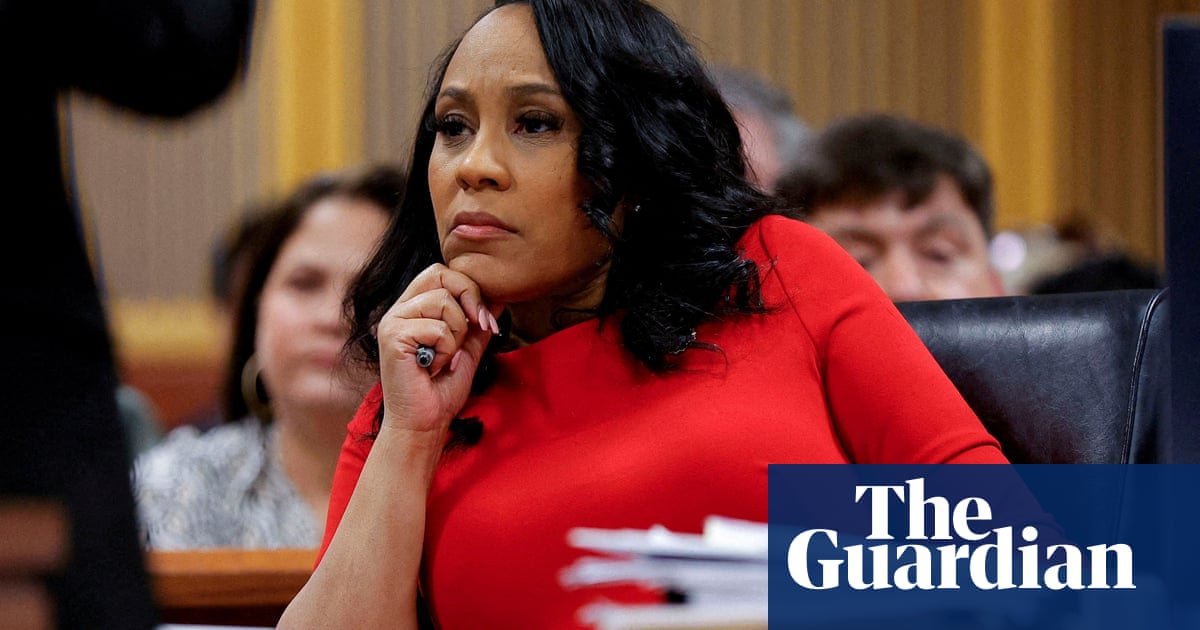The Georgia court of appeals has put a hold on the trial of Donald Trump and other defendants while it considers whether to disqualify the Fulton county district attorney, Fani Willis, the lead prosecutor in the case.
Trump had appealed an order by the Fulton county superior court judge Scott McAfee that declined to disqualify Willis after bombshell revelations about a romantic relationship with her chosen special prosecutor. As part of their effort to dismiss the case, Trump and his co-defendants alleged Willisâs relationship meant she should be recused from the case.
On Monday, the appeals court selected a three-judge panel to hear the appeal and docketed the case to be heard in October. Then on Wednesday, the court paused the case while this argument plays out.
Both the Trump attorney Steve Sadow and a spokesperson for Willisâs office declined comment on the courtâs order.
The order staying the case in Fulton county essentially ensures that the former president will not be tried on charges of election interference and racketeering in Georgia before the November election.
âThe history books will look back on what the country lost by not having a televised trial before November 2024 and historians will wonder what Fani Wills was thinking. And theyâll just scratch their heads,â said Anthony Michael Kreis, a constitutional law professor in Georgia and a close observer of the case. âI donât know how much Judge McAfee could have done between now and the appealâs pendency anyway. But the real loss is McAfeeâs ability to deal with the question of presidential immunity and the supremacy clause over the summer.â
Trump was charged alongside more than a dozen associates last year with racketeering over his efforts to overturn the 2020 election result in the state, after Georgia voted for Joe Biden to become US president.
Willis won her Democratic primary bid for re-election with nearly 90% of the vote last month.
Nine of the initial 19 defendants, including Trump, remain in the case and have appealed the lower-court decision allowing the case to continue.
Trump faces charges of violating Georgiaâs Racketeer Influenced and Corrupt Organizations Act â Rico â stemming from his work with lawyers, political organizers and other aides in an alleged âcriminal enterpriseâ to retain power after losing the 2020 election to Biden.
The charges stem in part from the âperfect phone callâ Trump made to Georgiaâs secretary of state, Brian Raffensperger, asking him to âfind 11,780 votesâ and flip Georgiaâs election, as well as an alleged scheme to submit an alternate slate of Republican electors to Congress in order to provide the then vice-president, Mike Pence, a rationale to reject the electoral count and send the election to the House to decide.
Revelations in January that Willis had a romantic relationship with special prosecutor Nathan Wade led to days of courtroom spectacle as Trump attorneys tore into Willisâs private life while arguing that she had an impermissible conflict of interest. A few days after Ashleigh Merchant, an attorney for the defendant Michael Roman, made Willisâs relationship a legal issue in court filings, Willis addressed a historically Black church in Atlanta to discuss the controversy. Willis described the revelations as an act of racism.
after newsletter promotion
Trumpâs lawyers subsequently argued that those statements in the âchurch speechâ created âforensic misconductâ â an act by a prosecutor that requires disqualification in Georgia law.
McAfeeâs ruling, while deeply critical of Willis, allowed the case to continue as long as either Wade or Willis stepped aside. Wade resigned within minutes of the ruling.
The law, however, is unclear about how the forensic misconduct standard should be applied, a point McAfee made in his ruling and that has formed the basis for much of the appeal.
In the appeal, Trumpâs attorneys argue that Willis was not honest when testifying about the relationship, creating an appearance of impropriety that requires her removal.
Each of the appeals courtâs 18 members is elected to a six-year term. Georgiaâs court of appeals is one of the busiest in the country, hearing 2,500 cases a year. It typically resolves a case within nine months because state law requires appeals to be resolved quickly. Most cases are resolved without oral arguments, decided only by written briefs, though it would be surprising for the court to forgo oral arguments in a case as important as one against a former president.



